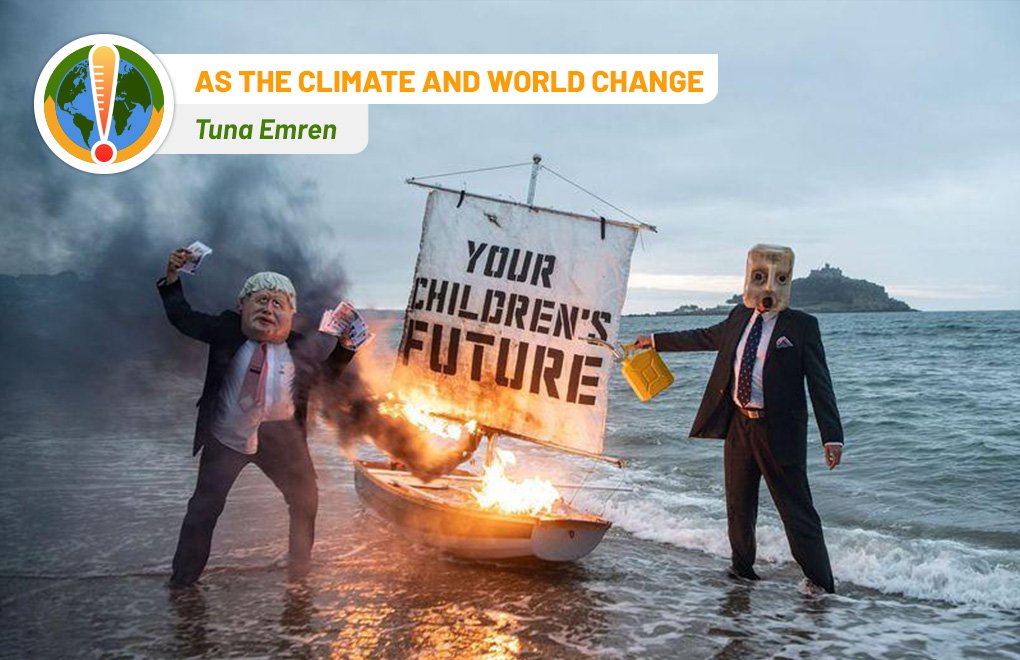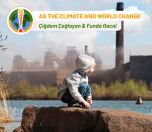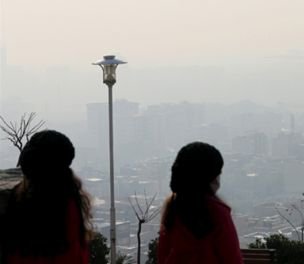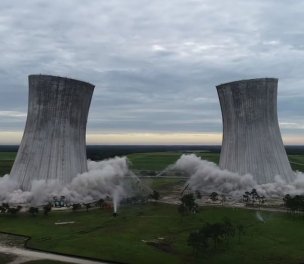* Credit: Ocean Rebellion
Click to read the article in Turkish / Kurdish
We stand in the middle of a global-scale pandemic, witnessing various ecological disasters taking place around us. We are at a historical breaking point, where social inequality becomes visible, and out-of-control crises come one after another.
We must obviously make a choice.
Can't we be a prosperous, democratic, peaceful civilization where there are zero greenhouse gas emissions, the principles of equality and justice are not compromised, and all fundamental rights are guaranteed?
Do we really have a chance to advance to such a future under capitalism, which is literally a fossil fuel system that glorifies capital rather than life?
Energy as a growth indicator
Our civilization continues its industrial development in an uncivilized way by burning the remains of the prehistoric creatures dug up from the earth's crust. It's not civilized because what determines how advanced a civilization is has to with how it has resolved its energy needs.
The famous Kardashev scale, frequently used in astronomy, says that the rate of technological progress cannot be considered an indicator of development. Has the energy problem been solved in a way that the planet and life do not pay the price? Only this matters. How advanced and how intelligent civilization is can be decided based on this question.
Nikolai Kardashev, an astronomer from Russia, said that advanced civilizations would be intelligent enough for a transition to sophisticated systems. In other words, this is a civilization that celebrates not competition but solidarity and honors not national but universal values.
Therefore, it is expected to rise on a model of society in which all kinds of inequalities are overcome, the distinction between the rich and the poor is left in the past, borders are abolished, and life is prioritized instead of capital.
The cost of the fossil fuels
The level of the humanity on Kardashev scale is about 0.7, which means that we have not even reached the Type1 civilization. We have to climb two more steps to spread out to the planets in our own solar system, let alone achieving dreams of interstellar travel.
The classification defines the characteristics of our situation as follows: There is a traceable rate of development, but it cannot use the resources of the planet efficiently because it still provides its energy needs from fossil fuels. In short, we are not a very intelligent civilization.
Although fossil fuels are a natural source of energy, continuing to burn them out of the ground has come at a heavy price, such as the deterioration of the climate system. We warmed the planet by 1.5 degrees compared to pre-industrial times.
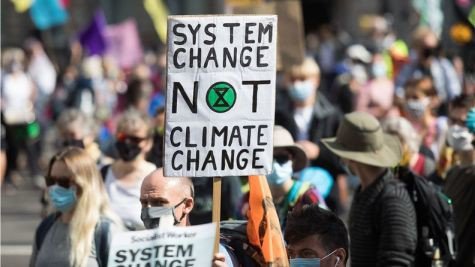
The United Nations Intergovernmental Panel on Climate Change (IPCC) says that we need to stabilize warming at 1.5C by 2030 at the latest. We cannot exceed this limit. If we fail to stay at 1.5C, we will quickly move towards 2 degrees of warming. In 2C, we burn our return ticket. Because the warming ocean water begins to absorb less carbon dioxide (CO2), the density of CO2 that mixes into the atmosphere increases, and the warming accelerates.
Unfortunately, we also sacrifice 40 percent of the rainforest, which means a decrease in the carbon density of the soil and doubling of the amount released into the atmosphere. As if these were not enough, the lost vegetation also emits carbon. Warming is accelerating.
Reaching the 2C, where these factors will come into play, means sailing to the 3C. And much more drastic changes come into play at the 3C degree – you don't want to know beyond that.
What are we waiting for?
The timeframe is getting tighter, and we only have nine years left to reduce emissions enough to keep us within the 1.5C limit. We really don't have a minute to lose.
The transition to a zero-carbon economy is a technologically achievable goal. Especially in the last ten years, renewable energy technologies have become affordable in terms of installation costs and energy product prices. Even fossil fuel giants like BP started to shift their investments into this field.
So, what are we waiting for to actualize the transformation?
When we look at individual political actors, we can see that almost all of them participate in climate summits and present emission reduction targets. However, the same actors keep policies based on supporting the fossil fuel industry in effect.
When the United Nations (UN) decided to take action to prevent waiting disasters in 1992 (Rio Conference), it asked world leaders to commit.
At that time, the rate of CO2 in the atmosphere had reached a frightening level, which confirmed warming was accelerating. In 1994, the United Nations Framework Convention on Climate Change entered into force. It has been 26 years since the first climate summit was held in 1995 (COP1, Berlin).
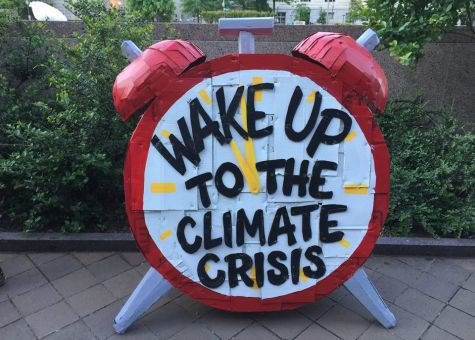
* Credit: Amy Stansbury
100 fossil fuel companies shaping the future
If we look at the global emissions of the last 26 years, we see that 100 fossil fuel companies are responsible for 71 percent. Moreover, world banks have invested1.9 trillion dollars in fossil fuels since the Paris Agreement.
The recent report by REN21, which carries out studies focused on renewable energy policies, showed that the share of fossil fuels in global energy consumption has remained almost unchanged (80 percent) in the last decade.
For example, Turkey - which ranks 15th in the list of countries emitting the most - continues to set archaic targets such as increasing coal production and supporting investment in coal-fired power plants.
As revealed in the REN21 report, many countries that announce reduction targets at climate summits are actually spending on the fossil fuel industry six times more than renewable energy. And the share of renewable energy sources remains at 11.2 percent (2019).
Same recitations for 30 years
We have been listening to the same recitations for almost 30 years, even though there is a climate emergency. Emissions continued to increase throughout the history of climate summits. Glaciers are melting fast enough to surprise even climate scientists. If the melting in the Arctic Ocean continues at this rate, we will witness ice-free Arctic summers in 2030.
The oceans got warmer day by day, their chemistry had changed, sea creatures were forced to migrate, the balance of sensitive ecosystems was disturbed. The frequency and destructive effects of hurricanes and typhoons increased as the sea surface temperature rose above normal values. The permafrost soil in the Arctic began to melt, resulting in massive methane releases – as if our CO2 emissions were not enough.
The facts are out there. Rapidly rising CO2 levels show that these 'steps forward' taken at UN summits are taking us further back.

Capitalism grows by destruction
Fossil fuels and capitalism are not two different phenomena that could be evaluated separately. As socialist writer and environmental activist Ian Angus from Canada stated in his book, Facing the Anthropocene: Fossil Capitalism and the Crisis of the Earth System; fossil fuels are "not a layer to be peeled off capitalism" because they are "infused into every cell of the system".
From the capitalists' point of view, accomplishing a renewable energy transformation means moving to a new system that will bring more costs to them by overwriting their already operating profitable investments and therefore jeopardizing their market power and advantages. In other words, they do not want to lose their 'acquired rights'.
Since capitalist production, carried on under the leadership of enraged capitalists, must grow continuously, irrational phenomena such as capital accumulation and surplus production come into play. A profit-oriented system cannot have ecological or ethical concerns. This is a degenerate system that claims even economic problems can be solved with more growth.
Frederich Engels asked the following question in his article titled The Role of Labor in the Transition from Ape to Man: "What cared the Spanish planters in Cuba, who burned down forests on the slopes of the mountains and obtained from the ashes sufficient fertilizer for one generation of very highly profitable coffee trees!"
Capitalism is an inherently destructive system. Like an elephant that has entered a glassware shop, it is progressing by breaking down and growing at the expense of creating crises. On the one hand, it encourages excessive consumption. On the other hand, it starves 10 percent of the world population.
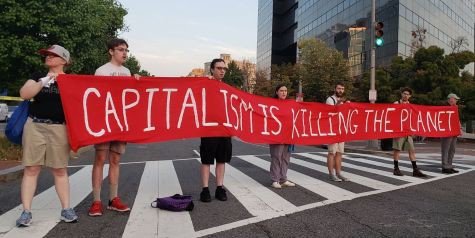
Saving the future
The reason why we are not able to achieve an energy transformation, which is de facto possible, and decrease our emissions is that such a transformation is against the interests of the capitalists. That's why we need to target the system itself, not the climate.
If we were to solve this crisis, which is a clear class issue, without transforming our production system, we should have already reached a point with the emission reduction commitments of the leaders. But that doesn't happen.
Decision-makers continue to deceive and distract us. The fossil fuel industry, supported by decision-makers, struggles to maintain its power and free itself from controls. In a nutshell, billions of people are driven into an unprecedented extinction as the real culprits of the crisis multiply their fortunes.
Now, we must transform our production systems. Life or fossil fuels? The future or the capital?
At this breaking point where we can't just focus on the omens and continue to ignore the real problem, the choice we make will determine the fate of all humanity and much of life on the planet, nothing less.
If we consider that we don't have much time to change the course and how we spend the remaining time is critical, isn't it time to abandon the vain hopes of fictitious carbon capture technologies or deceptive market mechanisms like carbon trading?
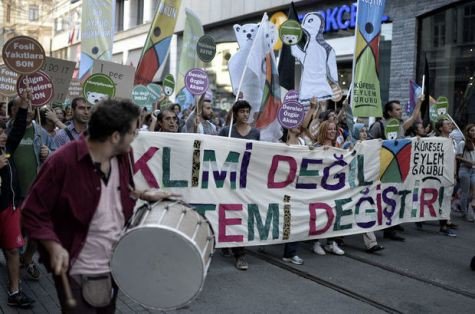
* Credit: Erdem Şahin
The difference between 'zero' and 'net zero'
Targets to reduce carbon emissions are handled in two different ways: zero-carbon or net zero. It may seem like there isn't much difference between them, but the latter is an indirect indication of the unfounded trust in the questionable carbon capture technologies.
This is an extremely dangerous scam.
The word 'net' emphasizes that some technologies that will emerge in the future and capture excess carbon in the atmosphere will solve this crisis, so countries can rely on it and continue business as usual.
However, we have not been able to see a working example of these technologies so far. Even if they can be implemented, they will only be able to capture the gases released in our lifecycle, and they will do this with an imprecise maximum success rate of 60 percent. It also requires an extraordinarily large land.
On top of that, they use fossil fuels (by causing enormous air pollution) and release toxic by-products to the seas and land. They have not been proved to be economically viable, too.
These risky and high-cost negative emission technologies, let alone solving the problem, create brand new ecological crises, and damage natural habitats and biodiversity, delaying real steps to be taken towards decarbonization.
The big con
A recent report, titled The Big Con, lists the main tactics used in the "net zero" fraud by announcing a list of multinational polluters such as Microsoft, Amazon, Apple, Walmart, HSBC, Cargill, Nestle as well as fossil fuel giants such as Shell, BP, Total. It shows that these companies resorted to various tricks for greenwashing.
For example, the climate plan offered by Walmart completely ignores the value chain emissions that make up about 95 percent of the company's carbon footprint, while Total is implementing projects behind the scenes that will enable it to reach a 50 percent increase in oil and gas production between 2015-2025.
A radical solution to a radical problem
If we do not want to find ourselves in climate chaos where the planet has become unrecognizable, there is only one solution left: Renouncing the capitalist mode of production, which is advancing as if it were devoted to make us become extinct.
It is not strange that in the face of such a radical problem, where our approach will be decisive for life, extremely radical solutions are needed. The strangest thing is that we cannot give up on a production system that considers capital more important than life, even while we are actually experiencing that all crises deepen as we continue with it. (TE/SO/EÜ/SD)
"As The Climate and World Change" article series*
Our life becomes history while we live! - Ömer Madra
1/ A country outside of the global climate policy: Turkey - Ebru Voyvoda
2/ Climate change, securitarian policies and ghosts - Özdeş Özbay
3/ Turkey's energy policy: Indigenous at home, Blue Homeland in the world - Emre İşeri
4/ The impact of climate crisis and fossil fuels on child health - Çiğdem Çağlayan & Funda Gacal
5/ We will see beautiful days, coal-free and sunny days - Elif Ünal
6/ Either capitalism or the future - Tuna Emren
7 / The three pillars of climate journalism: Science, politics, and social justice - Ece Baykal Fide
8 / Bringing science, struggle, and art together - Yasemin Ülgen
9 / Clean energy or betrayal? - Serkan Ocak
10 / It is time to say stop economic growth - Fikret Adaman & Gökçe Yeniev
11 / When climate refugees knock on our door - Mehmet Mücteba Göktaş
13 / Climate crisis affects women, women affect climate struggle - Merve Özçelik
14 / Climate fiction in literature- Buket Uzuner
15/ Dr. Faustus and children in the age of fire- Ömer Madra
* This series of articles is published with the financial support of Oslo Metropolitan University (OsloMet) Journalism & Media International Center.





